Success in Afghanistan heavily relies on the successes of its neighbor,Pakistan. Recognizing this important relationship, British ForeignSecretary David Miliband visited Pakistan ahead of the AfghanistanConference in London. During his time in Pakistan, Miliband heldmeetings with Pakistani government officials as well as private sectorprofessionals.
South Asia Archive
Free Newsletter
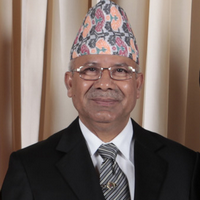
Bereft of an ally since the collapse of monarchical rule in Nepal nearly four years ago, China has been struggling to secure its place in the buffer state, wedged between China’s volatile Tibet region and its regional rival, India. Hardly a month goes by now without a high-level Chinese delegation arriving in Kathmandu seeking assurances on its security interests. In February 2005, China offered then-King Gyanendra a lifeline by calling his seizure of power, which otherwise prompted widespread international condemnation, an internal matter. A year later, when the royal regime no longer seemed tenable, China scrambled to build ties with […]
Bilateral relations between Bangladesh and India have recently improvedas Bangladesh clamps down on separatist rebels. Indian officials wereoptimistic during the first official visit of the Bangladeshiprime-minister to Indian soil while both nations have interests inimproved relations that could facilitate trade and securitycooperation. Al Jazeera’s Prerna Suri reports from New Delhi.
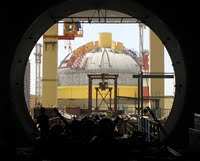
The U.S.-India civilian nuclear agreement, signed in October 2008 after intense bilateral negotiations, is a crucial trade deal for both nations, offering India’s fledgling civilian nuclear industry the opportunity to access sophisticated U.S. technology, while providing American companies with the possibility of significant commercial benefits from the engagement. However, despite the deal’s obvious benefits and the urgency displayed by both countries to get it signed over a year ago, obstacles still remain to making it operational. To finalize the agreement, the Bush administration overruled longstanding U.S. non-proliferation policy by implicitly recognizing India as a nuclear power. The deal was also […]
NewsHour talks to the Washington Post’s David Ignatius and authorJarret Brachman about the alleged Jordanian double agent whosuccessfully completed a suicide mission against CIA operatives inAfghanistan. The incident has brought to light long-standingintelligence ties between Jordan and the United States.
If you haven’t read them yet, take a look at Richard Weitz’s WPR column on China’s interest in overseas naval bases and Saurav Jha’s WPR briefing examining China’s “third island chain” strategy. When you’re done, take a second, too, to read Hugh White and Sam Roggeveen, both at the Interpreter, on China’s aircraft carrier ambitions. White argues that China is unlikely to follow the orthodox path to great naval power status, because, as he says, it would be dumb to do so. It’s a cost-intensive move at a time when the naval environment favors denial over control. And Jha’s article […]
There’s a lot to digest from Gen. Michael Flynn’s internal report (.pdf) on the U.S. intelligence effort in Afghanistan, not least of which is that it was released by CNAS. Flynn, after all, is the acting commanding general of the . . . U.S. intelligence effort in Afghanistan. When I first saw the report mentioned in a blog post, my mind’s eye inserted a ghost “(ret.)” after his name. Given Defense Secretary Robert Gates’ recent remarks about airing policy debates in public being a career-ending offense, one wonders whether that won’t, rightly or wrongly, soon be the case. As for […]
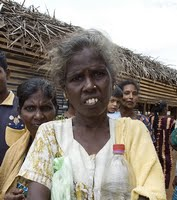
Last month, the Indian central government abruptly ended days of violent protests by carving out a federal state for the Telangana region of Andhra Pradesh. In an effort to end a five-decade-long internal conflict, the world’s largest democracy ceded a state for the greater good of stability and governance. India’s war-weary neighbor, Sri Lanka, would do well to take a page from New Delhi’s playbook as it looks to foster peaceful relations with its own minority Tamil population. The Sri Lankan government must take advantage of its recent military defeat of the Tamil Tigers insurgency (LTTE) by negotiating for political […]
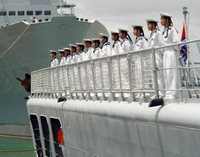
Analysts have long wondered if the Chinese navy (PLAN) had a third island chain strategy, beyond the publicly declared strategies for the first island chain (centered on Taiwan) and second island chain (extending from Japan to Indonesia). Many American commentators believed that such a strategy would refer to the ability to project power capable of reaching America’s bases in Hawaii. However, China’s recent maritime activities — such as its extended counterpiracy patrols in the Horn of Africa and its involvement in a number of port development projects in Indian Ocean littorals (dubbed the “string of pearls”) — have raised the […]
Afghan President Hamid Karzai is accusing NATO and U.S. forces of taking the fight against the Taliban too close to home. In an interview with Al Jazeera’s Hashem Ahelbarra, Karzai said that if night raids continue on Afghan civilians, foreign military forces will have more than just the Taliban to deal with. Karzai says that he wants Afghan sovereignty returned to the people.
Afghanistan’s parliament rejected 17 or President Hamid Karzai’s 24 cabinet nominees. NewsHour’s Margaret Warner speaks with Afghanistan’s ambassador to the U.S., Said Jawad, about what the vote means for his country’s political future. Said says that though the rejections could be seen as a setback, the parliament’s decision is a step in the right direction for the democratic process in Afghanistan.
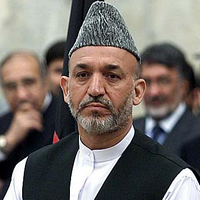
The governments of the United States and its NATO allies routinely characterize Afghan President Hamid Karzai as corrupt and incompetent. These unjust accusations come after the West grossly mishandled Karzai for years, often placing damaging and contradictory pressures on him since he assumed the presidency in 2004. Karzai’s recent decision to expel two ministers tarnished by graft allegations is a positive sign of his efforts to improve the effectiveness and transparency of his administration, one that warrants recognition from the often-critical international community as a concrete example of good governance. The silence from the West following these firings speaks volumes […]
